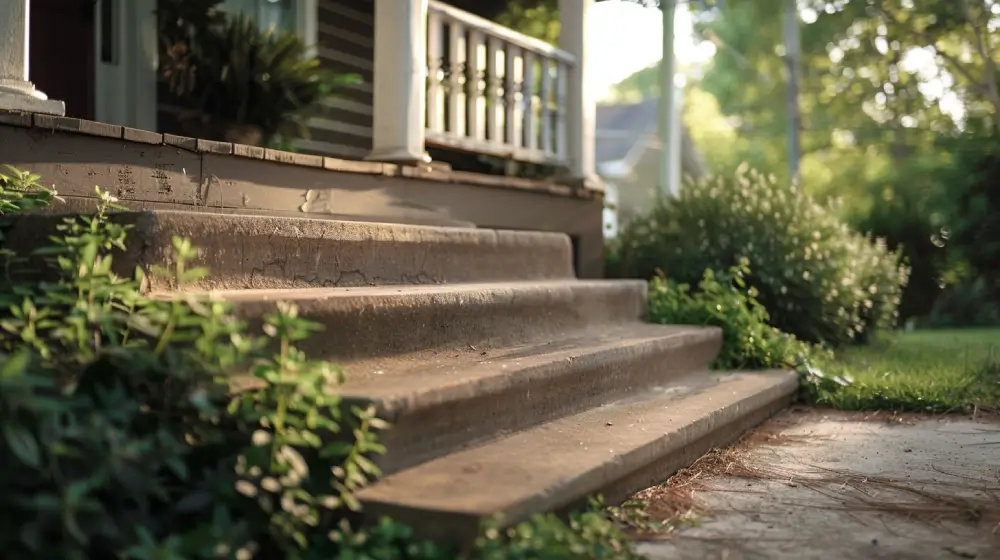When you start shopping for concrete stain, you may see terms like “solid concrete stain” or “semi-transparent concrete stain.” And beyond that, there are acid stains vs. water-based stains. So you may wonder: What’s the difference? And which one is the best for my project? Let’s dive in…
What is the difference between semi-transparent and solid concrete stain?
Semi-transparent and solid concrete stains both refer to water-based concrete stains. Neither stain will penetrate the surface of the concrete, as water-based concrete stain only leaves a colored film on the surface. Water-based concrete stains are typically easier to apply, less toxic, and come in a wider variety of colors than acid stains.

The difference between semi-transparent and solid concrete stains is in the name. Semi-transparent stains will leave a wash of color behind, but you will still be able to see variations in the concrete peeking through. Think of it like a wood stain that deposits color behind but doesn’t hide the wood grain. A solid concrete stain acts more like paint and will leave an opaque finish behind on the concrete.

Which is better, semi-transparent or solid stain?
Water-based semi-transparent and solid concrete stains are applied in the same way and are equally durable. Which option is better for you depends on the look you want to achieve. Do you want an even, opaque appearance similar to paint? You’ll prefer solid concrete stain. Do you want to just tint the surface of the concrete with color without covering up its variations? You’ll want semi-transparent concrete stain.
What kind of stain is best for concrete?
If you’re looking for the most long-lasting and durable finish, you’ll want to use a concrete acid stain. Acid-based stain formulas chemically interact with the concrete to form a permanent bond that will not peel, chip, or fade as easily overtime.

If you’re familiar with wood stains, compare a concrete acid stain to a penetrating wood stain that embeds itself deep in the wood grain. Note that acid stains are more difficult to apply, more toxic, and must be properly neutralized and sealed.
Water-based concrete stains are film-forming stains, meaning that they leave a layer of pigment behind on the concrete surface. This means that it’s easier to get an even, predictable finish than with acid-based stains, but the film finish is more likely to chip, peel, and fade over time. Compare this to a non-penetrating wood stain, such as gel stain. If you care more about choosing a stain with easier application, less toxicity, and a more predictable finish, a water-based concrete stain may be better for you.
What are the disadvantages of solid stains?
Solid concrete stains are water-based stains, meaning that they leave behind an opaque colored film on the surface of the concrete, similar to paint. Because the pigment doesn’t penetrate the surface of the concrete, it’s more likely to chip and peel over time than an acid stain. However, if you take the proper steps to prepare your concrete surface before staining, you can ensure a more durable finish and extend the life of your solid concrete stain.

A solid concrete stain will also completely cover the concrete and look like paint. This can be an advantage if you have concrete slabs of different colors that you want to match, or if you have unsightly concrete patches that you want to disguise. But if you prefer for your concrete to maintain its stone-like finish, you’d be better off choosing a semi-transparent concrete stain.
Does solid concrete stain peel?
Yes, like any water-based concrete stain, solid concrete stain will eventually fail and peel over time just like paint. You can extend the lifetime of your solid concrete stain by taking extra precautions before and during the application of your stain to ensure proper adhesion and durability, such as using a concrete bonding primer prior to staining.

Is acid stain better than water-based?
Concrete acid stains will give a more long-lasting and durable finish, but they’re also trickier to apply, contain more toxic ingredients, and must be properly neutralized and sealed after application. The entire application process is more complex and the results less predictable. And if you have concrete slabs of different ages or composition, they will each react differently to the acid stain and may not match.
Water-based concrete stains are much more DIY-friendly, come in a wider range of colors, provide more even color coverage, contain fewer harmful chemicals, and don’t require neutralization or sealants. But because they only form a tinted film on the surface of the concrete, they are less durable and will eventually peel, chip, and fade over time.

The choice is which is better—acid stains or water-based stains—is up to you and what you prioritize for your concrete stain project.
How long does acid concrete stain last?
Acid concrete stains chemically interact with your concrete to form a permanent bond, but they can fade over time with exposure to foot traffic, weather, and chemicals. It’s recommended that you re-seal your acid-stained concrete surface every 2–4 years to maintain its color and durability.

How long does water-based concrete stain last?
How long your water-based concrete stain lasts depends on a variety of factors, everything from how well you prepped your concrete surface before applying stain to what the stained concrete is exposed to (e.g. foot traffic, tire traffic, pooling water, extreme temperatures). Depending on the stained concrete’s original application adhesion, physical location, and level of use, it can last anywhere from a couple years to a couple decades, just like paint.

I hope this guide was helpful to you! If you’re looking for a concrete staining tutorial, head to How to Apply Solid Color Concrete Stain. If you want to learn DIY home basics, check out my course DIY Renovation for Beginners.
